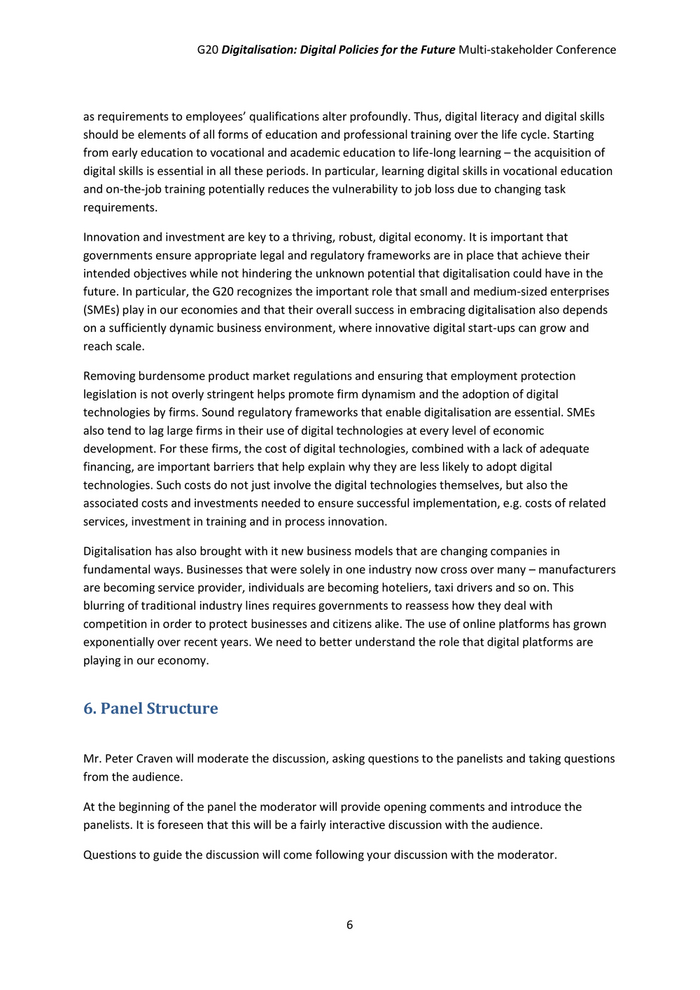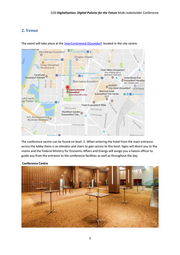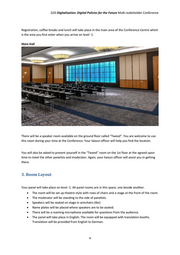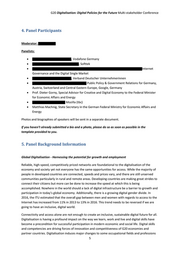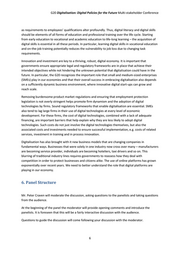Microsoft Outlook - Memoformat
Dieses Dokument ist Teil der Anfrage „E-Mails vom Kreativbeauftragten Dieter Gorny“
, VIB Von: Dieter Gorny < @t-online.de> Gesendet: Montag, 20. März 2017 08:16 An: @musikindustrie.de Cc: @musikindustrie.de Betreff: WG: Information for Speakers - G20 Multi-Stakeholder Conference - 6 April - Düsseldorf Anlagen: PANEL 1 Global Digitalisation.pdf; 170308_EN_ Agenda MSK 6 April draft.pdf; BMWi-G20-Arbeitstreffen-Kurzviten-Wordvorlage-lay01.docx anbei zur info und vorbereitung best Gesendet mit der Telekom Mail App -----Original-Nachricht----- Von: @bmwi.bund.de Betreff: Information for Speakers - G20 Multi-Stakeholder Conference - 6 April - Düsseldorf Datum: 10.03.2017, 17:09 Uhr An: @t-online.de CC: @musikindustrie.de, @bmwi.bund.de Dear Prof. Gorny, We are very pleased that you will be joining us soon in Düsseldorf for the G20 "Digitalisation: Digital Policies for the Future" Multi-stakeholder Conference. This email is to provide you with some of the information you will need for the event. Firstly, the official agenda can be found online which includes a message from the Federal Minister for Economic Affairs and Energy, Brigitte Zypries. I have also attached a more recent version as there have been a number of changes since it was posted. Panel Information There is a document attached on Panel 1. It contains information about the venue, the content and panel structure. I invite you to review this document and please let us know if you have any questions. The panel moderator, Peter Craven, will be in touch with you in next two weeks to discuss the modalities of the session and where you might focus any remarks. I would appreciate if you could send 3-5 bullets on what you might like to address during the panel that can be shared with the moderator prior to them making contact. On-site, we would also like to the gather panelists prior to the session. Please let me know if you prefer to meet before the event begins, for example around 9:30am, or right before the panel at the coffee break at 11:45am. 1

Logistical Information Liaison Officer: You will be assigned a liaison officer (LO) who will assist on site. The name and telephone number for the LO will be provided shortly before the conference. Registration: We ask that you please register as soon as possible for the event at: https://g20germany- accreditation.de/bmwi/digitalisation/guest/ You will require the following information to do so: Username: Gorny Password: You are also welcome to invite one other person from your organisation to attend. Please send me their name and email address as soon as possible so they can receive their registration username and password. Accommodations: I am pleased to inform you that hotel costs for speakers at the Intercontinental where the event is taking place will be covered for two nights - from 5 to 7 April. The hotel has been provided the names of speakers so please go ahead and make arrangements. The charges for those nights will not appear on the bill. Biographies: We will be providing you a package with all the bios of your panel. Please let me know if there are any issues with it being shared or posted publicly. If you have any questions regarding logistics (hotel, registration) please contact: @bmwi.bund.de, otherwise please contact me anytime. Kind regards, G20 Advisor, Digital Economy Organisation for Economic Co-operation and Development (OECD) VIA4, Ministry for Economic Affairs and Energy Tel: | @bmwi.bund.de Scharnhorstrasse 34-37, 10115 Berlin, Germany 2

6 April 2017: G20 Multi-stakeholder Conference “Digitalisation: Policies for a Digital Future” (Agenda as of 9 March) Moderator: 10:30 – 10:45 Introduction 10:45 – 11:15 Welcome Remarks Economics, Energy, Industry and Commerce of the State of North Rhine-Westphalia, Germany Brigitte Zypries, Federal Minister for Economic Affairs and Energy, Germany 11:15 – 11:45 Keynote I: Board of Management Deutsche Telekom, Germany 11:45 – 12:15 Coffee break 12:15 – 13:45 3 Parallel Sessions: Panel 1: Global digitalisation – Harnessing the potential for growth and employment Moderator: Panelists: Vodafone Germany Softtek; Mexico on Internet Governance and the Digital Single Market; The Netherlands Verband Deutscher Unternehmerinnen, Germany Prof. Dieter Gorny, Special Advisor for Creative and Digital Economy to the Federal Minister for Economic Affairs and Energy, Germany Public Policy & Government Relations for Germany, Austria, Switzerland and Central Eastern Europe, Google, Germany Mozilla (tbc) Matthias Machnig, State Secretary in the Federal Ministry for Economic Affairs and Energy, Germany

Panel 2: Digitising production for the future – Internationally harmonizing norms and standards Moderator: Panelists: European Patent Office American National Standards Institute; USA VDE and Pepperl&Fuchs, Germany Schaeffler, Germany , Fraunhofer-Institut für Materialfluss und Logistik IML, TU Dortmund, Germany You Can Group and Future Food Institute, Italy Panel 3: Encouraging transparency – Creating confidence in the digital world Moderator: Panelists: Internet and Jurisdiction; France Internet Society; USA World Privacy Forum; USA , Berlin University of the Arts; Germany ; Telefonica S.A.; Spain EU Government Affairs, Microsoft Europe; Belgium Federal Ministry of Justice and Consumer Protection, Germany 13:45 – 14:45 Lunch break and networking 14:45 – 15:15 Wrap-up of the three sessions, Questions & Answers 15:15 – 15:45 Keynote II , KT Korea Telecom; Korea 15:45 – 16:30 Minister´s Talk and Concluding Remarks

G20 "Digitalisation: Digital Policies for the Future” Multi-stakeholder Conference Düsseldorf PANEL 1: Global Digitalisation: Harnessing the potential for growth and employment Thursday, 6 April 2017 Time: 12:15pm-1:45pm In this document, you will find information about: 1. OVERVIEW 2. VENUE 3. ROOM LAYOUT 4. PANEL PARTICIPANTS 5. PANEL BACKGROUND INFORMATION 6. PANEL STRUCTURE For more information, please contact: @bmwi.bund.de or @bmwi.bund.de 1

G20 Digitalisation: Digital Policies for the Future Multi-stakeholder Conference 1. Overview Digitalisation is a driver of growth for both individual countries and the global economy as a whole. In particular, digital technologies can contribute to sustainable growth through innovation in products, processes and organisational transformations. Digital technologies offer new opportunities for businesses, workers and citizens to engage in economic and social activities. At the same time, not everyone is able to take advantage of this digital world equally. To unleash the potential that digitalisation can bring to innovation, growth and employment, it is important to identify existing barriers and to develop necessary conditions and frameworks to overcome these obstacles. In the2016 Hangzhou communiqué, G20 Leaders committed to make innovation a key element of their efforts to identify new engines of growth. The German G20 Presidency, which is focused on “Shaping an Interconnected World”, is hosting for the first time a meeting of Digital Ministers on 6/7 April in Düsseldorf to set out policy actions for a digital future. The challenge for us all is to identify the right levers that will enable our economies to best maximise the benefits of an increasingly digitalised global economy. To do so, it is essential to ensure access to, and participation in, the digital economy for all; maximise the contribution of digital innovations to productivity, economic growth, job creation and well-being; and to build trust and resiliency for networks and users. Given the wide range of issues digitalisation touches, views from all stakeholder communities are important to ensuring we maximize the opportunities being brought on by these technological changes. The Digital Ministers agenda is focused on the following three core areas: Global Digitalisation - Harnessing the potential for growth and employment The digital transformation comes not only with opportunities, but also with challenges – challenges which the G20 want to look at and address together. It is important to use digitalisation to foster global growth. This means that barriers to growth need to be identified and new solutions developed for the years ahead. Digitising production for the future - Internationally harmonizing norms and standards Twenty-first century industry is global; companies around the world are connected with one another via the internet. This means that internationally harmonised standards are urgently needed in order to ensure interoperability between the different systems. Encouraging transparency - Creating confidence in the digital world In order to leverage the full potential of digitalisation and the internet, transparency and trust are essential – for both consumers and companies alike. For further information on the G20 digital agenda please visit: http://www.de.digital/DIGITAL 2

G20 Digitalisation: Digital Policies for the Future Multi-stakeholder Conference 2. Venue The event will take place at the InterContinental Düsseldorf located in the city centre. The conference centre can be found on level -1. When entering the hotel from the main entrance across the lobby there is an elevator and stairs to gain access to this level. Signs will direct you to the rooms and the Federal Ministry for Economic Affairs and Energy will assign you a liaison officer to guide you from the entrance to the conference facilities as well as throughout the day. Conference Centre 3

G20 Digitalisation: Digital Policies for the Future Multi-stakeholder Conference Registration, coffee breaks and lunch will take place in the main area of the Conference Centre which is the area you first enter when you arrive on level -1. Main Hall There will be a speaker room available on the ground floor called “Tweed”. You are welcome to use this room during your time at the Conference. Your liaison officer will help you find the location. You will also be asked to present yourself in the “Tweed” room on the 1st floor at the agreed upon time to meet the other panelists and moderator. Again, your liaison officer will assist you in getting there. 3. Room Layout Your panel will take place on level -1. All panel rooms are in this space, one beside another. The room will be set up theatre style with rows of chairs and a stage at the front of the room. The moderator will be standing to the side of panelists. Speakers will be seated on stage in armchairs (tbc) Name plates will be placed where speakers are to be seated. There will be a roaming microphone available for questions from the audience. The panel will take place in English. The room will be equipped with translation booths. Translation will be provided from English to German. 4
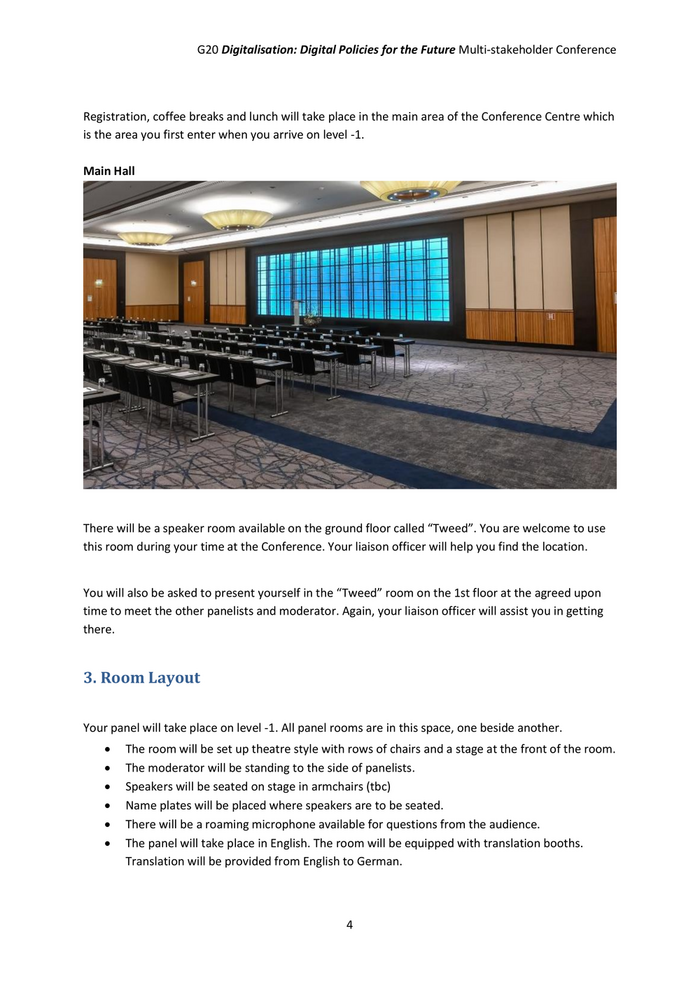
G20 Digitalisation: Digital Policies for the Future Multi-stakeholder Conference 4. Panel Participants Moderator: Panelists: , Vodafone Germany , Softtek Internet Governance and the Digital Single Market , Verband Deutscher Unternehmerinnen Public Policy & Government Relations for Germany, Austria, Switzerland and Central Eastern Europe, Google, Germany Prof. Dieter Gorny, Special Advisor for Creative and Digital Economy to the Federal Minister for Economic Affairs and Energy Mozilla (tbc) Matthias Machnig, State Secretary in the German Federal Ministry for Economic Affairs and Energy Photos and biographies of speakers will be sent in a separate document. If you haven’t already submitted a bio and a photo, please do so as soon as possible in the template provided to you. 5. Panel Background Information Global Digitalisation - Harnessing the potential for growth and employment Reliable, high-speed, competitively priced networks are foundational to the digitalisation of the economy and society yet not everyone has the same opportunities for access. While the majority of people in developed countries are connected, speeds and prices vary, and there are still unserved communities particularly in rural and remote areas. Developing countries are making great strides to connect their citizens but more can be done to increase the speed at which this is being accomplished. Nowhere in the world should a lack of digital infrastructure be a barrier to growth and participation in today’s global economy. Additionally, there is a growing digital gender divide. In 2016, the ITU estimated that the overall gap between men and women with regards to access to the Internet has increased from 11% in 2013 to 13% in 2016. This trend needs to be reversed if we are going to have an inclusive, digital world. Connectivity and access alone are not enough to create an inclusive, sustainable digital future for all. Digitalisation is having a profound impact on the way we learn, work and live and digital skills have become a precondition for successful participation in modern economic and social life. Digital skills and competencies are driving forces of innovation and competitiveness of G20 economies and partner countries. Digitalisation induces major changes to some occupational fields and professions 5
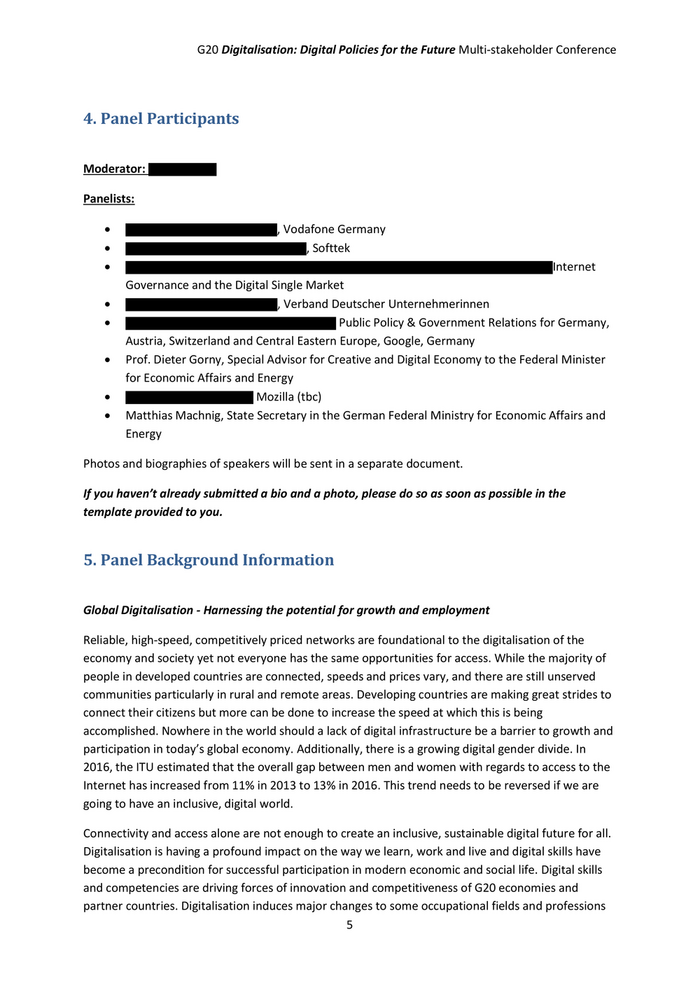
G20 Digitalisation: Digital Policies for the Future Multi-stakeholder Conference as requirements to employees’ qualifications alter profoundly. Thus, digital literacy and digital skills should be elements of all forms of education and professional training over the life cycle. Starting from early education to vocational and academic education to life-long learning – the acquisition of digital skills is essential in all these periods. In particular, learning digital skills in vocational education and on-the-job training potentially reduces the vulnerability to job loss due to changing task requirements. Innovation and investment are key to a thriving, robust, digital economy. It is important that governments ensure appropriate legal and regulatory frameworks are in place that achieve their intended objectives while not hindering the unknown potential that digitalisation could have in the future. In particular, the G20 recognizes the important role that small and medium-sized enterprises (SMEs) play in our economies and that their overall success in embracing digitalisation also depends on a sufficiently dynamic business environment, where innovative digital start-ups can grow and reach scale. Removing burdensome product market regulations and ensuring that employment protection legislation is not overly stringent helps promote firm dynamism and the adoption of digital technologies by firms. Sound regulatory frameworks that enable digitalisation are essential. SMEs also tend to lag large firms in their use of digital technologies at every level of economic development. For these firms, the cost of digital technologies, combined with a lack of adequate financing, are important barriers that help explain why they are less likely to adopt digital technologies. Such costs do not just involve the digital technologies themselves, but also the associated costs and investments needed to ensure successful implementation, e.g. costs of related services, investment in training and in process innovation. Digitalisation has also brought with it new business models that are changing companies in fundamental ways. Businesses that were solely in one industry now cross over many – manufacturers are becoming service provider, individuals are becoming hoteliers, taxi drivers and so on. This blurring of traditional industry lines requires governments to reassess how they deal with competition in order to protect businesses and citizens alike. The use of online platforms has grown exponentially over recent years. We need to better understand the role that digital platforms are playing in our economy. 6. Panel Structure Mr. Peter Craven will moderate the discussion, asking questions to the panelists and taking questions from the audience. At the beginning of the panel the moderator will provide opening comments and introduce the panelists. It is foreseen that this will be a fairly interactive discussion with the audience. Questions to guide the discussion will come following your discussion with the moderator. 6
